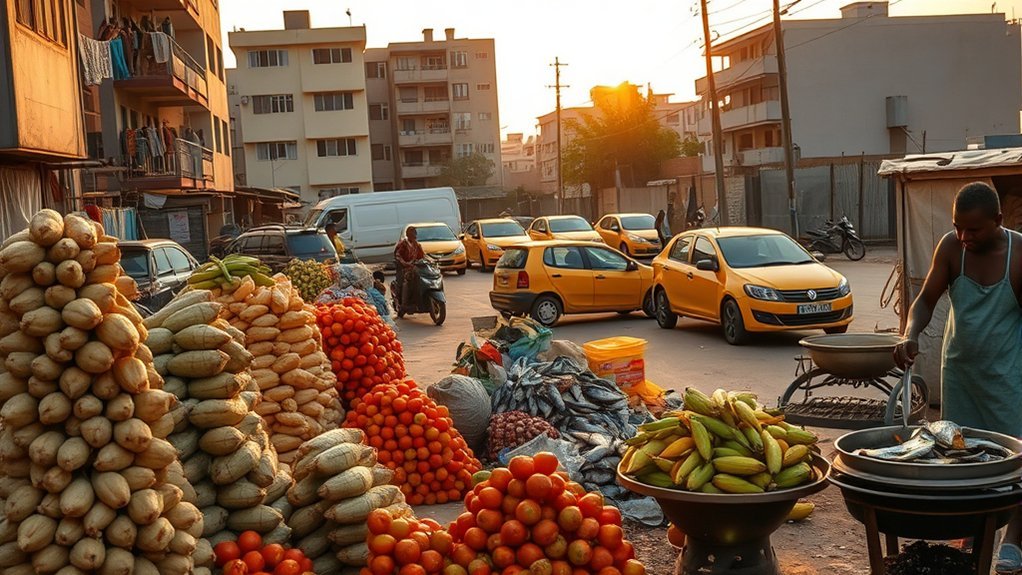You’ll find living in Ivory Coast much cheaper than in the U.S.; overall costs run roughly 50–55% lower and rents can be 70–80% cheaper than U.S. cities. Expect basic monthly non-rent expenses around 492,900 CFA (~$750) for a single person and about 1,723,100 CFA (~$2,627) for a family of four; central one-bedroom rents average ~292,600 CFA. Utilities, internet and food are affordable, but salaries are lower, so plan budgets carefully — keep going to see practical breakdowns and tips.
Cost of Living Overview: Ivory Coast Vs United States

While you’ll find some costs similar, living in Ivory Coast is markedly cheaper than in the United States: overall expenses run about 54.3% lower, with average rents roughly 79% below New York levels.
In this cost of living overview: ivory coast vs united states, you’ll note concrete differences: a family of four spends about $2,626.90 monthly (1,723,132.1 CFA) excluding rent, while a single person’s non-rent expenses average $751.50 (492,940.9 CFA).
Dining out is particularly cheaper: a mid-range meal for two runs ~40,000 CFA (~$65), less than half typical U.S. prices.
Dining out is notably cheaper in Ivory Coast: a mid-range meal for two costs about 40,000 CFA (~$65), under half U.S. prices.
Utilities for a family average ~106,666.67 CFA (~$174), roughly comparable to U.S. utility bills depending on use.
Transport is low-cost—you’ll pay ~550 CFA (~$0.90) for a one-way ticket versus about $2.35 in the U.S.
These numbers help you quickly compare budgeting priorities and identify where you’ll save most: rent, food, and local transport.
Monthly Budget Estimates for Singles and Families
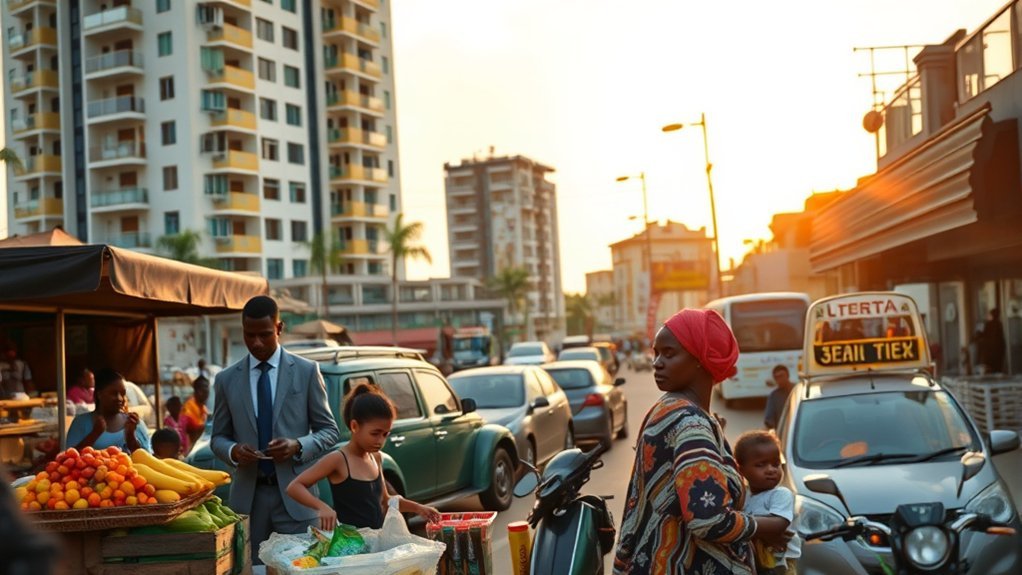
Because housing and food make up the biggest shares of monthly spending, you can plan around clear benchmarks: a single person in Ivory Coast typically needs about $751.50 (≈492,941 CFA) per month for non-rent expenses, while a family of four requires roughly $2,626.90 (≈1,723,132 CFA), excluding rent.
Those estimated monthly costs give you a concrete starting point to compare lifestyles and set priorities. Abidjan’s non-rent cost base is 54.3% lower than New York’s, so your everyday spending power stretches farther, and average utilities for an 85m² apartment run about 106,666.67 CFA monthly.
Use these figures to model scenarios, adjust discretionary lines, and forecast savings.
- You’ll feel relief seeing clear, city-to-city comparisons.
- You’ll gain confidence when budgeting for school, groceries, and transport.
- You’ll face trade-offs between convenience and savings.
- You’ll plan rent separately since housing changes total cost considerably.
Housing and Rental Prices in Abidjan and Beyond
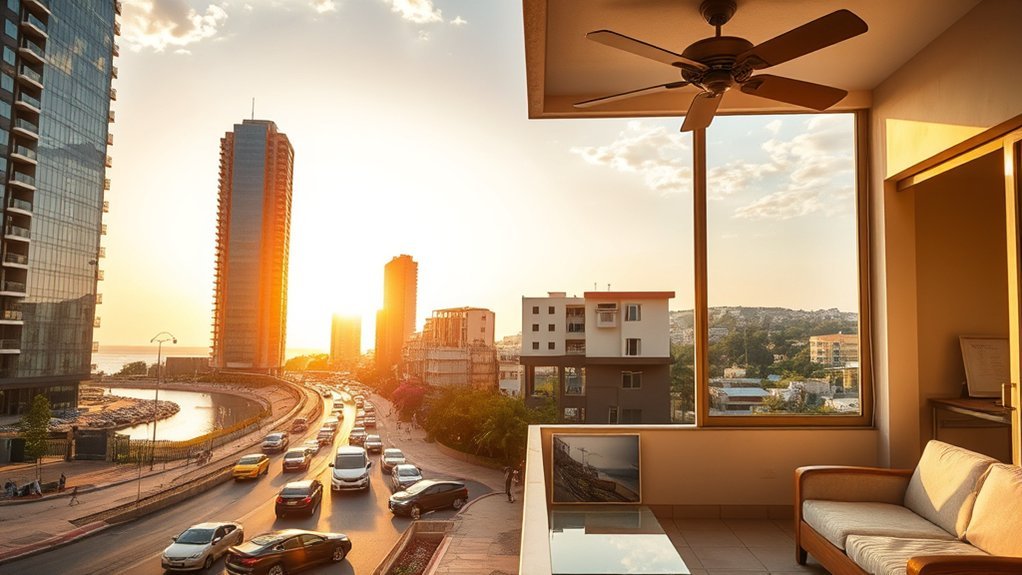
If you’re budgeting for housing in Ivory Coast, start with Abidjan where a one-bedroom city-center apartment averages about 292,593 CFA per month and a three-bedroom outside the center runs roughly 573,750 CFA — figures that sit against average net monthly earnings of only ~112,500 CFA and make rental affordability a clear constraint; factor in utilities (~106,667 CFA for an 85 m² unit) and internet (~22,500 CFA) to see how quickly housing swallows take-home pay and to compare costs across neighborhoods and smaller cities.
| Unit type | Typical monthly rent (CFA) | Notes |
|---|---|---|
| 1BR city center | 292,593 | common for singles in living in Abidjan |
| 3BR outside center | 573,750 | family option, often suburban |
| Utilities (85 m²) | 106,667 | electricity, water, waste |
| Internet (60+ Mbps) | 22,500 | standard urban plan |
| Average net salary | 112,500 | highlights affordability gap |
You should compare neighborhoods, consider shared housing, or look beyond Abidjan for better value.
Grocery and Food Costs: Markets, Restaurants, and Street Food

After budgeting rent and utilities, you’ll want to map out food costs to see how far your remaining income goes: a mid-range dinner for two runs about 40,000 CFA, but everyday options are much cheaper — a McMeal is roughly 6,500 CFA, a 0.5L draught beer about 600 CFA, and street-food and market purchases often undercut restaurant prices.
You’ll find grocery prices reasonable: 1L milk ~1,191.67 CFA, 500g white bread ~291.67 CFA, 12 eggs ~1,216.58 CFA, and 1kg chicken fillets ~3,900 CFA. Local markets supply fresh produce at lower prices than supermarkets, so you can trim food costs by buying seasonally and locally.
Compare restaurant frequency to cooking at home to model monthly spend; eating out often doubles your per-meal expense. Practical tip: mix market purchases with occasional restaurant meals to balance convenience and budget.
Emotionally, you’ll enjoy varied flavors without high expense if you plan.
- Relief: fresh markets cut grocery bills.
- Confidence: clear prices aid planning.
- Joy: street food delivers value.
- Control: cook more, spend less.
Utilities, Internet, and Household Expenses
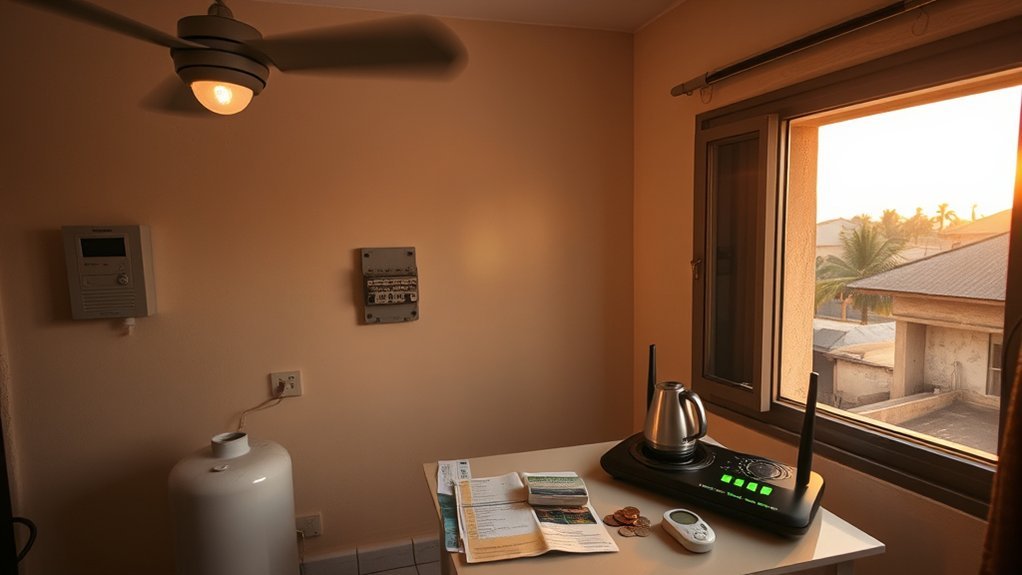
You’ll typically pay about 106,667 CFA monthly for utilities in an 85 m² apartment, which is relatively affordable compared with many Western cities.
Fast internet plans (60 Mbps+) run around 22,500 CFA per month, so factor that into your monthly housing budget alongside rent.
Comparing these figures to city-center rent (~292,593 CFA) helps you quickly assess total housing-related costs.
Monthly Utility Expenses
While utilities and internet costs in Ivory Coast are generally lower than in many Western countries, they still make up a significant portion of a household budget: a typical family pays about $190 monthly for electricity, water, heating/cooling, and garbage, and a 50+ Mbps internet plan runs around $46.80.
You’ll find monthly utility expenses for an 85m² apartment near $180 (106,667 CFA), which compares favorably to higher Western bills but is sizable relative to local wages. Rent differences (one-bedroom city center ≈ $500, three-bedroom outside ≈ $1,000) change the share utilities occupy in your budget.
Use the data to plan: prioritize energy-efficient appliances and monitor consumption to control costs.
- You’ll notice bills can spike during hot months.
- Small adjustments cut expenses quickly.
- Reliable internet at $46.80 boosts productivity.
- Utilities make living costs predictable.
Internet Plans & Speeds
Utilities often make up a steady slice of your monthly budget, and internet is a notable line item: a 50+ Mbps plan averages about $46.80 per month in Ivory Coast, generally cheaper than comparable Western plans but subject to speed variability from network congestion.
You’ll find a range of internet plans with prices tied to speed and data caps; pick faster tiers for streaming or work-from-home needs. Urban centers like Abidjan deliver better infrastructure and more consistent performance, while rural areas may face accessibility and quality gaps.
Providers are generally reliable, but expect occasional slowdowns during peak hours. For cost-efficiency, compare plans by effective speed, monthly fee, and data limits, and factor in installation or equipment costs.
Transportation and Commuting Costs

You’ll find public transport in Ivory Coast is inexpensive — a one-way fare runs about 550 CFA and a monthly pass about 27,500 CFA, so regular riders save considerably.
Taxis start near 1,000 CFA with distance-based surcharges and ride-hailing prices can be higher during peak times, so factor fares into daily budgets.
If you’re considering driving, gasoline is roughly 875 CFA/liter while a used Volkswagen Golf costs about 16,500,000 CFA, making vehicle ownership considerably more capital-intensive than using transit.
Public Transport Fares
One-way local transport in Ivory Coast runs about 550 CFA, and a monthly pass costs roughly 27,500 CFA, so if you commute regularly the pass typically saves money over buying single tickets every day.
You’ll find public transport fares are low compared with many Western countries, so daily commuting stays affordable.
Expect slower journeys and crowding at peak times, but reliable routes in major cities keep costs predictable.
If you’re weighing car ownership, gasoline at ~875 CFA/liter and taxi start fares from 1,000 CFA make private travel pricier over time.
- Relief: low public transport fares cut monthly expenses.
- Trade-off: affordability comes with crowding.
- Predictability: fixed fares simplify budgeting.
- Choice: pass or pay-as-you-go based on frequency.
Taxi and Ride-hailing
If you found public buses crowded at peak times, you’ll likely consider taxis or ride-hailing for faster, more direct trips—an 8 km taxi ride runs about 16,100 CFA, while the 1,000 CFA flag drop keeps short hops affordable.
You’ll pay more than the 550 CFA one-way local ticket, but ride-hailing often adds convenience: app fares can be similar to taxi meters during off-peak hours and marginally higher with surge pricing.
For regular commuters, compare monthly pass savings (≈27,500 CFA) against frequent taxi or ride-hailing expenditure; at three round trips daily, private fares quickly exceed a pass.
Use taxi for occasional direct trips and ride-hailing when you need reliability, receipts, or fixed-route comparisons.
Fuel and Vehicle Costs
While public transit and taxis keep daily travel cheap, owning and running a car in Ivory Coast shifts costs toward fuel and purchase price: gasoline sits around 875 CFA per liter and a popular compact like a Volkswagen Golf sells for roughly 16,500,000 CFA.
So you should compare monthly fuel consumption and maintenance against the 27,500 CFA monthly pass—especially if you commute frequently. You’ll weigh fuel and vehicle costs versus convenience: single rides cost ~550 CFA, taxis start at ~1,000 CFA, and frequent trips add up.
If you drive, estimate liters/month × 875 CFA plus insurance, servicing, and depreciation against the monthly pass or occasional taxis to decide economical mobility. Practical budgeting matters.
- Fear: unexpected repairs.
- Relief: clear monthly pass savings.
- Pride: owning a car.
- Regret: high fuel bills.
Healthcare, Insurance, and Medical Expenses
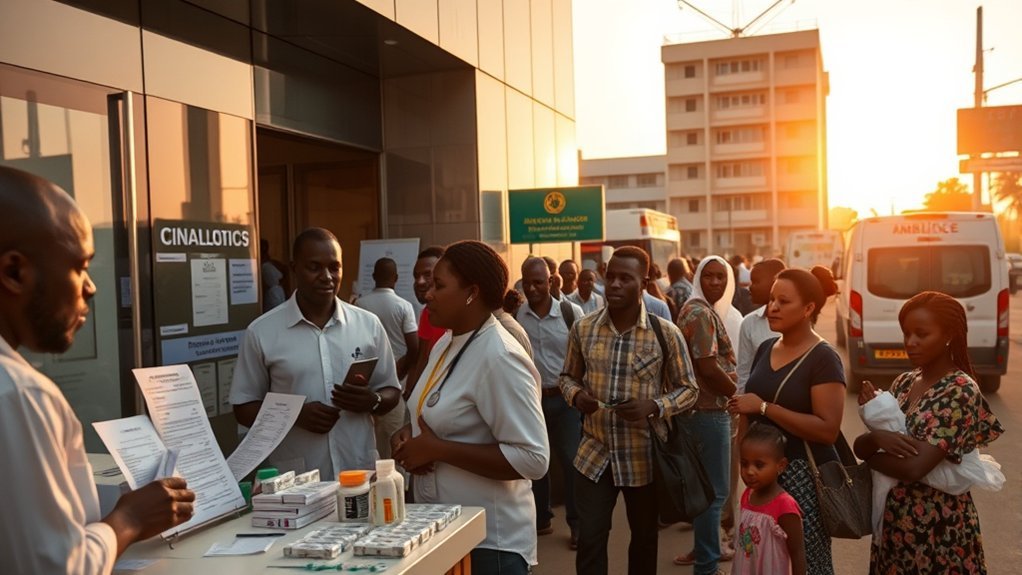
Because public hospitals are often overcrowded and under-resourced, you’ll frequently turn to private clinics for reliable care, but that choice comes with noticeably higher out-of-pocket costs and a strong recommendation for extensive expatriate insurance.
Healthcare in Ivory Coast is comparatively more expensive than in neighboring countries with stronger public systems; private consultations can cost several times public fees, and specialized procedures often require referrals abroad.
You’ll find medical insurance premiums for expatriates reflect limited local capacity and language barriers—plans that include evacuation or treatment in francophone, anglophone, or regional hubs cost more but reduce financial risk.
For budgeting, treat routine private visits, diagnostics, and prescriptions as recurring high expenses; emergency care and hospital stays can produce sudden, large bills.
If you don’t speak French, factor in the additional cost of expatriate-friendly clinics or translators.
Practically, secure thorough international or regional coverage before arrival, compare policy coverage limits, and set aside an emergency health fund equivalent to several months of living expenses.
Salaries, Job Market, and Salary Adjustment Calculator

You’ll find average net pay around 112,500 CFA per month, with typical ranges varying widely by sector—higher in finance and tech, lower in hospitality and local services.
Compare those figures to your home country using a Salary Adjustment Calculator to estimate purchasing-power differences (note: a family of four’s monthly costs excluding rent are roughly 1,723,132 CFA).
Use that comparison to set realistic salary expectations and negotiate offers in education, finance, hospitality, or technology.
Typical Salary Ranges
One useful benchmark is the average net monthly salary—about 112,500 CFA (≈$184)—which frames earning expectations in Ivory Coast and highlights wide variation by sector, experience, and nationality.
When you look at typical salary ranges, you’ll see local workers often earn near that average, while expatriates and skilled specialists can command multiples, especially in finance, tech, and international education.
Use a Salary Adjustment Calculator to compare purchasing power with your home country and decide if an offered wage meets your needs. Negotiate based on cost-of-living differences and role seniority.
Consider these emotional realities:
- Relief — local wages can stretch farther because of lower living costs.
- Surprise — gaps between local and expat pay can be large.
- Confidence — data helps you negotiate fairly.
- Caution — verify offers against real expenses.
Job Market Sectors
While broad averages hide important differences, the Ivorian job market clearly favors sectors like finance, IT, education, and hospitality—each with distinct pay scales, hiring practices, and growth prospects. You’ll find finance and IT pay above the national average (≈112,500 CFA/month), education and hospitality often pay less but offer steady demand. Expatriates attract higher offers in finance and technology; networking drives hires across sectors. Use a salary adjustment calculator to compare purchasing power before negotiating.
| Sector | Typical Pay Level | Hiring Notes |
|---|---|---|
| Finance | High | Uses formal recruitment, expatriate roles |
| IT | High | Skills-driven, project contracts common |
| Education/Hospitality | Moderate/Low | Local networks and referrals dominate |
Focus on market data, compare offers, and plan based on sector differences.
Salary Adjustment Tips
After comparing sector pay and hiring norms, it helps to quantify how an Ivorian salary will actually buy goods and services where you’ll live.
Use the Salary Adjustment Calculator to compare purchasing power between Ivory Coast and the United States; it shows Abidjan is about 54.3% less expensive than New York (excluding rent).
With an average net monthly salary near 112,500 CFA, you’ll need to align expectations to local ranges in hospitality, finance, education, and tech.
These salary adjustment tips help you plan housing, utilities, and discretionary spending, and determine if expat compensation should include allowances.
- Calculate PPP-adjusted salary needs to match your target lifestyle.
- Compare sector averages to avoid underbidding.
- Budget using local prices, not US lists.
- Seek expat packages for housing and transport.
Safety, Neighborhoods, and Expat Living Tips
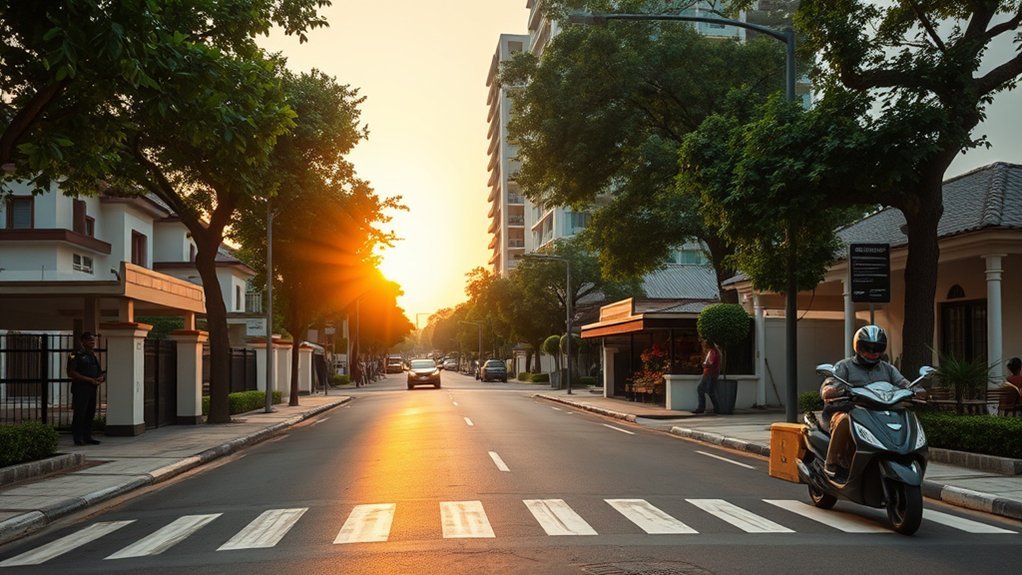
Although Abidjan blends traditional Ivorian culture with modern French influences—giving you diverse social and lifestyle options—it also has measurable safety challenges, with higher-than-average crime rates and incidents of armed robbery that have prompted increased policing in hotspot areas.
Abidjan blends Ivorian tradition and French influence, offering vibrant life but notable crime challenges and increased policing.
You should treat safety as a primary factor when choosing where to live: comparative data and local reports point to Plateau, Cocody, and Marcory as preferred expat districts offering better amenities and lower incident rates than peripheral neighborhoods.
Expect living costs (excluding rent) for a family of four around USD 2,626.9/month, significantly cheaper than New York, so you can often afford safer housing.
Healthcare quality varies; secure thorough medical insurance because both public and private services can be limited.
Practically, favor well-served neighborhoods with visible security, verify building protections and police response times, and balance cost savings against documented safety metrics to choose the best location for your lifestyle and risk tolerance.
Practical Steps for Moving and Setting Up in Ivory Coast
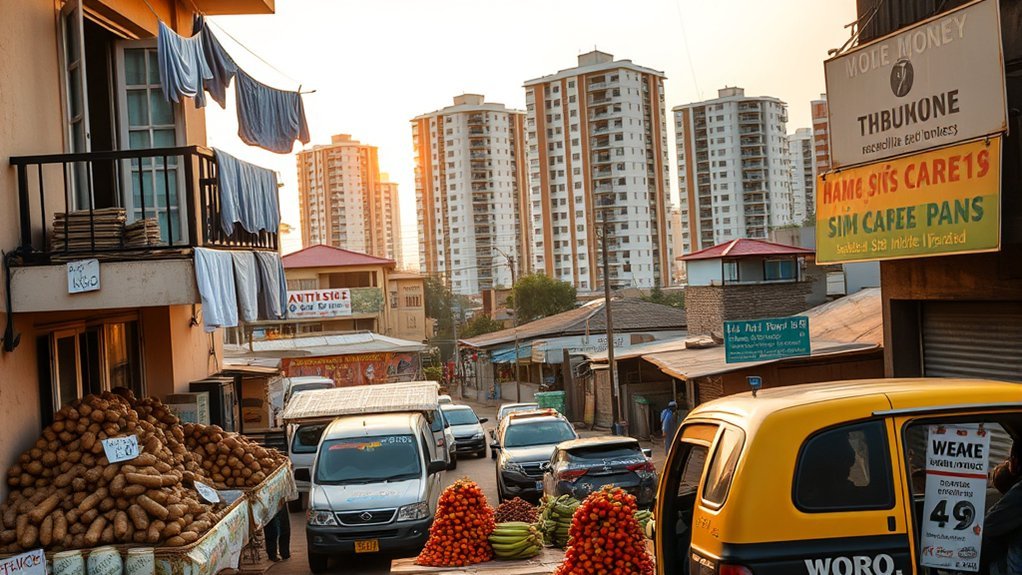
Because choosing the right neighborhood affects both safety and budget, start by comparing rental costs and incident rates in Plateau, Cocody, and Marcory—two-bedroom city-center apartments average about $500/month while utilities for an 85m2 unit run roughly 106,666.67 CFA/month.
Then factor in extensive medical insurance and visa requirements (some nationalities need pre-entry approval, others get visas on arrival) before committing to housing or employment searches. When moving, research housing listings, request utility estimates, and compare private clinic fees versus insurance premiums so you can quantify monthly outlays.
Verify visa rules and prepare proof of funds and passport validity; missing documentation delays work starts. Join expat networks to access localized job leads in hospitality and technology and to benchmark salary versus living costs.
Pack essential documents, arrange temporary accommodation, and schedule bank and SIM setup within your first week to avoid cash-flow gaps. Embrace a data-driven checklist to minimize surprises while living in Ivory.
- Anticipation: plan for higher private healthcare costs
- Relief: insurance mitigates risk
- Confidence: verified listings reduce fraud
- Community: expats speed job searches
Frequently Asked Questions
What Is the Average Salary in the Ivory Coast?
You earn about 112,500 CFA monthly on average in Ivory Coast; you’ll see salary comparison shows this lags developed countries, varies by sector, and practical negotiation or expat contracts often raise your pay considerably.
How Much Is Rent in the Ivory Coast?
Birds of a feather flock together: you’ll find Rental Prices in Abidjan range roughly 292,593 CFA for a one‑bed city center, 573,750 CFA for three‑beds outside, while shared rooms start near $200—compare, plan, budget.
How Much Is a Coke in the Ivory Coast?
A 330ml Coke costs about 300 CFA in Ivory Coast, around 600 CFA in restaurants; you’ll notice this compares favorably to $1.50 in the U.S. — practical, data-driven insight tied to Cultural Experiences.
Is the Ivory Coast a Good Place to Live?
Like a colorful mosaic, yes — you’ll find appealing Lifestyle Factors: lower living costs, vibrant culture, and friendlier social life, but you’ll need solid healthcare insurance and safety awareness, so compare data and plan practically before relocating.
Conclusion
You’ll likely find living in Ivory Coast considerably cheaper than in the United States — for example, rent in Abidjan can be about 60–70% lower than in many U.S. cities. Use that gap to budget: prioritize housing and local markets, expect utilities and private healthcare costs to bite, and plan salary negotiations accordingly. With practical prepping and local research, you’ll stretch your income further while enjoying a lower cost of living and vibrant urban life.

